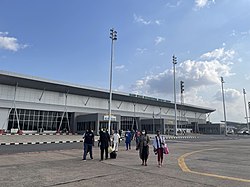Akanu Ibiam
Sir Francis Akanu Ibiam KBE | |
|---|---|
| Governor of Eastern Region, Nigeria | |
| In office 15 December 1960 – 16 January 1966 | |
| Preceded by | Sir Robert Stapledon |
| Succeeded by | Chukwuemeka Odumegwu Ojukwu |
| Personal details | |
| Born | 29 November 1906 Unwana, Afikpo North, Ebonyi State, Southern Nigeria Protectorate (now Nigeria) |
| Died | 1 July 1995 (aged 88) |
Sir Akanu Ibiam
Early years
Ibiam was born in Unwana, Afikpo, Ebonyi State on 29 November 1906, of Igbo background. He was the second son of Chief Ibiam, a traditional ruler of Unwana.[2] He later became traditional ruler, Eze Ogo Isiala I of Unwana and Osuji of Uburu. He attended
Ibiam was never ordained as a minister, but he was elected and ordained as an elder of the Presbyterian Church.[2] He was appointed an honorary officer of the
In the lead-up to Nigerian independence Ibiam served in local government, in the Eastern Regional House of Assembly, and in the Legislative and Executive Councils.
After Nigeria gained independence in 1960, Ibiam was appointed governor of
Nigerian Civil War
During the Nigerian Civil War of 1967–1970, Ibiam actively assisted the Biafrans, helping obtain relief supplies through his church contacts. As one of the six presidents of the World Council of Churches (WCC), Ibiam spoke at the WCC Meeting in Uppsala, Sweden, in July 1968 where the problem of relief for refugees was discussed.
Chief Bola Ige, Adviser to the Church of the Province of West Africa was also present, and ensured that the name "Biafra" was avoided in the WCC resolution, since that would imply recognition of the state. However, Ibiam was instrumental in ensuring that the nightly air lift of relief into Biafra was started.[10]
In 1969, he travelled across Canada to raise humanitarian aid and support for the people of Biafra. Ibiam returned his knighthood and renounced his English name, Francis, in protest against the British government's support of the Nigerian federal government.[11]
Later years
Following the war, Ibiam continued work on reconstruction and hospital service. Ibiam was responsible for the Bible Society of Nigeria and the Christian Medical Fellowship. He became a president of the All Africa Conference of Churches.[3]

Ibiam died on 1 July 1995. More than 20,000 people attended his funeral in Unwana.[11] The Akanu Ibiam International Airport, Enugu, the Akanu Ibiam Federal Polytechnic, Unwana, Ebonyi State, and the Francis Akanu Ibiam Stadium University of Nigeria, Nsukka are named after him.
See also
References
- ^ "Provinces and Regions of Nigeria". World Statesmen. Archived from the original on 18 April 2010. Retrieved 6 March 2010.
- ^ ISBN 978-0-8028-1771-6.
- ^ a b c d Gerald H. Anderson (1998). "Ibiam, (Francis) Akanu". Biographical Dictionary of Christian Missions. W. B. Eerdmans Publishing Company. Archived from the original on 8 September 2017. Retrieved 27 May 2010.
- ^ United Kingdom :"No. 38493". The London Gazette (Supplement). 31 December 1948. p. 23.
- ^ The London Gazette, 1 January 1951
- ^ a b "Central Africa: The Ibiam Affair". Time. 14 September 1959. Archived from the original on 1 February 2011. Retrieved 27 May 2010.
- ^ "Christ Church Chapel, University of Nigeria – Nsukka Campus". Retrieved 27 May 2010. [dead link]
- ^ The London Gazette, 24 August 1962
- ISBN 0-7146-2949-9.
- ^ D. C. Nwafor. "BORN TO SERVE: The biography of Dr. Akanu Ibiam". Archived from the original on 26 November 2010. Retrieved 27 May 2010.
- ^ a b "(Akanu (Francis)) Ibiam dies with Nigeria in chaos: despite great potential in human and natural resources". Presbyterian Record. 1996. Retrieved 27 May 2010.
